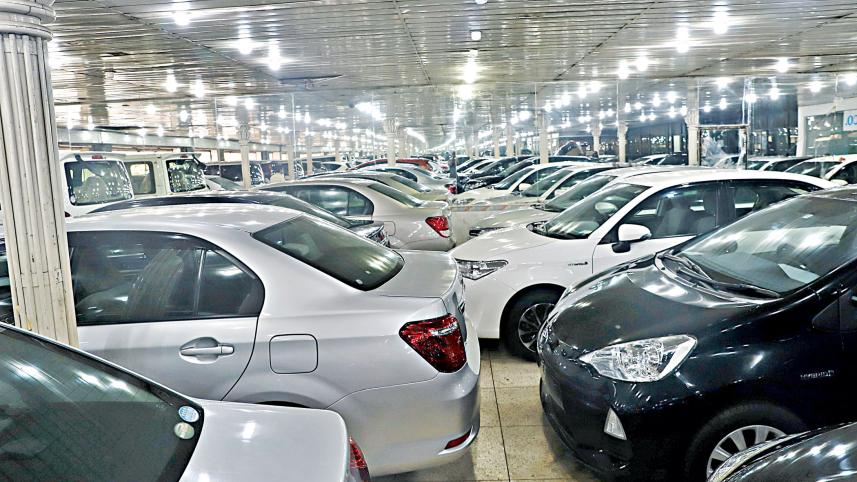Businesses urge local production of auto, agro machinery

The interim government needs to implement a long-term policy requiring manufacturers to locally produce key components of automobiles and agricultural machinery, said businesspeople at an event yesterday.
Such a policy is essential to reduce import dependency, strengthen backward linkage industries, and position Bangladesh as a competitive manufacturing hub in the region, they added.
They made these remarks at the closing ceremony of the "Road to Made in Bangladesh and Agro Machinery Fair 2025" in the capital's Tejgaon.
The Bangladesh Chamber of Industries (BCI), with support from the Bangladesh Automobiles Assemblers and Manufacturers Association and the Agricultural Machinery Manufacturers Association Bangladesh, organised the two-day fair at the BCI office.
Taskin Ahmed, president of the Dhaka Chamber of Commerce and Industry, said after years of effort, a motorcycle industry development policy was successfully formulated in 2018.
A policy is essential to reduce import dependency, strengthen backward linkage industries, and position Bangladesh as a competitive manufacturing hub, businesses say
It attracted major global brands like Honda, Yamaha, and Suzuki to invest around Tk 3,000 crore in Bangladesh, he said.
This led to the development of local manufacturing for components such as wheels, chain sprockets, and seats in regions like Pabna and Bogura, he said.
Highlighting the example of Southeast Asian countries, where up to 80 percent of car components are locally made, he expressed confidence that Bangladesh could achieve similar success, especially in the automobile and agro-machinery sectors.
Ahmed emphasised the importance of supporting small and medium enterprises in this endeavour, noting that strengthening local industries would not only boost exports but also reduce import dependency, thereby saving valuable foreign currency.
Anwar-Ul-Alam Chowdhury, president of the BCI, said many have asked why the BCI organised an automobile and machinery fair and whether it was truly to promote those industries.
The answer was yes, but more importantly, it was to drive growth in light engineering, he said.
When certain sectors gain traction and entrepreneurs show interest, demand increases, and opportunities open up. That's why the BCI launched this initiative to highlight the potential within Bangladesh, he added.
Going forward, manufacturing, especially light engineering, must be our focus, he mentioned.
Sk Bashir Uddin, adviser to the Ministry of Civil Aviation and Tourism and the Ministry of Commerce, said Bangladesh was a $400 billion economy but the question was why the country was unable to generate a surplus.
If excessive spending occurs without considering the sufficiency of resources, then a surplus will not be possible, he said, adding that Bangladesh must move forward based on its own capabilities.
It is not possible to go far simply by relying on policy support, he said, adding, "In our country, except for the garments sector, no other sector has been able to achieve anything significant through policy support."
"Before independence, Bangladesh had a distinctive industrial character, but that no longer exists," he said.
"Previously, industries from various countries around the world had developed here. Now, that is gone. After independence, Bangladesh has not been able to utilise that opportunity," he said.
AK Azad, managing director of the Ha-Meem Group of Companies, said in the banking sector, there is a tendency to lend to those who are already financially secure—those with significant assets and strong credit.
"These small industries we are building won't progress without proper financing. Without access to bank support, Bangladesh can't move forward," he said.
"That's why I urge the government to ensure continued support for small and medium enterprises during its tenure," said Azad, who is also the former president of the Federation of Bangladesh Chambers of Commerce and Industry.
Agriculture Secretary Mohammad Emdad Ullah Mian said Bangladesh needs to focus on sustainable modernisation, and the government has already initiated several steps.
Briefly, on behalf of the Ministry of Agriculture, they are developing Agriculture Outlook 2050, a 25-year strategic plan. The goal is to ensure nutritious food security through agro-economic development and to create a farmer-friendly environment, he said.
"Our main objectives include agro-processing and agro-industrialisation. Our aim is to formulate policies that maximise opportunities for domestic technology and industry," he added.
Hossain Zillur Rahman, executive chairman of the Power and Participation Research Centre and former adviser to the caretaker government, also spoke at the event.



 For all latest news, follow The Daily Star's Google News channel.
For all latest news, follow The Daily Star's Google News channel.